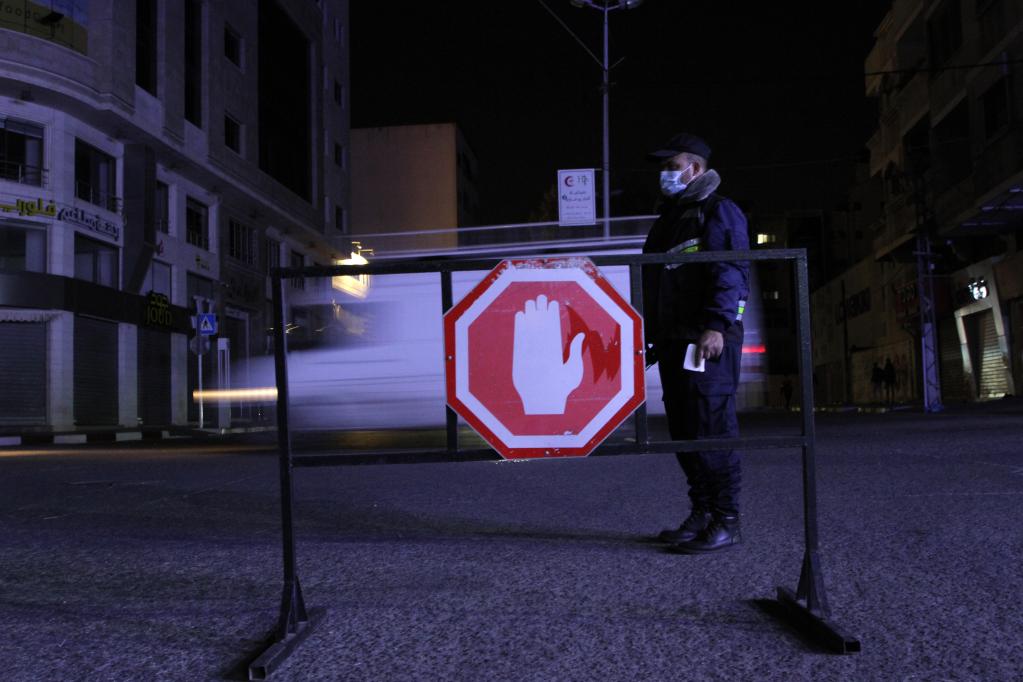
A policeman is on duty on a street in Gaza City, on April 21, 2021. Ahead of Ramadan, the Hamas-run local authorities declared a series of preventive measures to avoid the rapid spread of the COVID-19 and its new strains. The Hamas authorities then further tightened their measures, by imposing a complete lockdown during the night for five days and a total lockdown during Fridays and Saturdays after Gaza saw a significant increase in COVID-19 infections recently. (Photo by Rizek Abdeljawad/Xinhua)
by Sanaa Kamal
GAZA, April 21 (Xinhua) -- For Gazans, the month of Ramadan used to be associated with various celebrations and rituals. When the Gazans broke their fast, the streets started to be filled with children carrying their lanterns and worshipers making their way to mosques for prayer.
They also liked to pay visits to one another or just gather in public places. However, the spread of the COVID-19 pandemic makes life in Ramadan different.
"Unfortunately, Ramadan is not the same this year for Gazans," Hiba Khalili from Gaza city told Xinhua, as she prepared food for iftar, a traditional meal that breaks the fast.
The 42-year-old mother of three said that she found herself and her family "confined" to the house, unable to move around after iftar.
"It is my first time that I cannot visit my parents in Ramadan. They live in Rafah city, in the south of the Gaza Strip, and there is no transportation as we live under night curfew," she complained.
While adults miss their families, children miss their playmates. Mohammed Saleh, a 12-year-old child from Gaza city, complained that he cannot play with his peers in the streets after iftar, as his mother prevents him from leaving his house.
"My parents bought lanterns for my siblings and me, but we cannot (go out) and play with them," he said sadly, adding that he lost his happiness of Ramadan because of the tight restrictive measures that were imposed to curb the pandemic.
"In the past, my brothers, sisters, my friends and I used to play in the streets with our lanterns and enjoy looking at other teenagers playing with fireworks. Now, there is nothing," he said.
Ahead of Ramadan, the Hamas-run local authorities declared a series of preventive measures to avoid the rapid spread of the COVID-19 and its new strains.
The Hamas authorities then further tightened their measures, by imposing a complete lockdown during the night for five days and a total lockdown during Fridays and Saturdays after the enclave saw a significant increase in COVID-19 infections recently.
"The high rates put hospitals in the Gaza Strip under tremendous pressure, as they suffer from a shortage of intensive care units and medicines. Although vaccines did arrive, they were scarce as compared to the population," Ashraf Qidra, spokesman of the Gaza health ministry, told Xinhua.
Qidra warned that the health situation in the coastal enclave is "alarming," stressing that there are undiscovered new COVID-19 strains in the strip.
He noted that his ministry constantly gives recommendations to the Ministry of the Interior that are aimed at limiting the spread of the virus, which often include imposing partial or full lockdowns.
But those precautionary and preventive measures angered Gazan merchants and shopkeepers, as their trade and daily income were affected.
Mohammed Abu Saud, an owner of a desserts shop in Gaza city, was forced to close his shop after the iftar, as he suffered from heavy losses during Ramadan.
He said that his business in Ramadan depended mainly on selling desserts after iftar, especially as customers buy sweets as gifts for their relatives.
Darwish al-Rantisi, a cosmetics merchant from the Gaza city, told Xinhua that the tightened measures cut his sales by more than a half.
"The government adopts strict measures but does not care about our interests. We are losing our profits and will not be able to restore them easily," the father of two said.
So far, the Gaza Strip reported 93,910 cases of COVID-19, including 19,178 active cases and 808 deaths. Enditem




